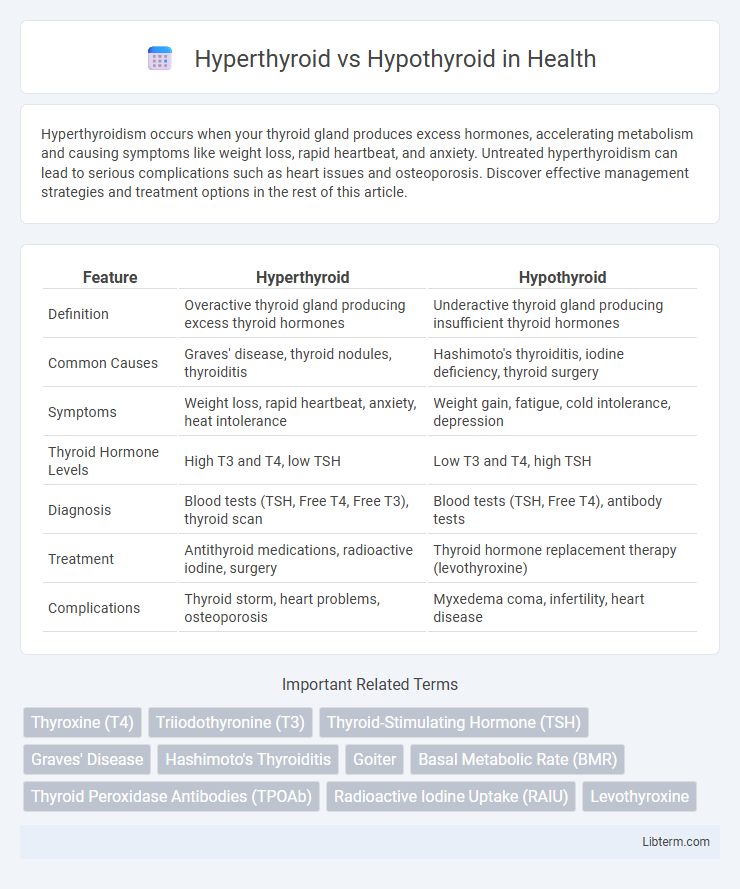Hyperthyroidism occurs when your thyroid gland produces excess hormones, accelerating metabolism and causing symptoms like weight loss, rapid heartbeat, and anxiety. Untreated hyperthyroidism can lead to serious complications such as heart issues and osteoporosis. Discover effective management strategies and treatment options in the rest of this article.
Table of Comparison
| Feature | Hyperthyroid | Hypothyroid |
|---|---|---|
| Definition | Overactive thyroid gland producing excess thyroid hormones | Underactive thyroid gland producing insufficient thyroid hormones |
| Common Causes | Graves' disease, thyroid nodules, thyroiditis | Hashimoto's thyroiditis, iodine deficiency, thyroid surgery |
| Symptoms | Weight loss, rapid heartbeat, anxiety, heat intolerance | Weight gain, fatigue, cold intolerance, depression |
| Thyroid Hormone Levels | High T3 and T4, low TSH | Low T3 and T4, high TSH |
| Diagnosis | Blood tests (TSH, Free T4, Free T3), thyroid scan | Blood tests (TSH, Free T4), antibody tests |
| Treatment | Antithyroid medications, radioactive iodine, surgery | Thyroid hormone replacement therapy (levothyroxine) |
| Complications | Thyroid storm, heart problems, osteoporosis | Myxedema coma, infertility, heart disease |
Introduction to Thyroid Disorders
Thyroid disorders primarily include hyperthyroidism, characterized by excessive thyroid hormone production, and hypothyroidism, marked by insufficient hormone levels. These conditions significantly impact metabolism, energy levels, and overall health due to the thyroid gland's regulatory role in endocrine function. Accurate diagnosis through blood tests measuring TSH, T3, and T4 levels is essential for effective management and treatment of these disorders.
What is Hyperthyroidism?
Hyperthyroidism is a condition characterized by an overactive thyroid gland producing excessive thyroid hormones, leading to accelerated metabolism and symptoms such as rapid heartbeat, weight loss, and nervousness. It contrasts with hypothyroidism, where the thyroid gland is underactive, causing fatigue, weight gain, and slowed metabolism. Diagnosing hyperthyroidism involves blood tests measuring elevated levels of thyroxine (T4) and triiodothyronine (T3), alongside suppressed thyroid-stimulating hormone (TSH) levels.
What is Hypothyroidism?
Hypothyroidism is a condition where the thyroid gland produces insufficient thyroid hormones, leading to a slowed metabolism and symptoms such as fatigue, weight gain, and cold intolerance. It contrasts with hyperthyroidism, which involves excessive hormone production and results in increased metabolism, weight loss, and heat intolerance. Accurate diagnosis typically involves measuring thyroid-stimulating hormone (TSH) and free thyroxine (T4) levels in the blood.
Key Differences Between Hyperthyroid and Hypothyroid
Hyperthyroid results from excessive thyroid hormone production, causing symptoms like weight loss, rapid heartbeat, and anxiety, while hypothyroid is characterized by insufficient hormone levels, leading to fatigue, weight gain, and depression. The thyroid-stimulating hormone (TSH) levels are typically low in hyperthyroidism but high in hypothyroidism due to feedback mechanisms. Diagnostic tests such as blood tests for TSH, free T4, and T3 levels are crucial in differentiating these conditions and guiding appropriate treatment.
Common Causes of Hyperthyroidism
Graves' disease is the most common cause of hyperthyroidism, accounting for the majority of cases due to autoimmune stimulation of the thyroid gland. Toxic multinodular goiter and toxic adenoma are other frequent causes, leading to excessive thyroid hormone production. In contrast, hypothyroidism often results from Hashimoto's thyroiditis, iodine deficiency, or thyroidectomy, resulting in insufficient hormone levels.
Common Causes of Hypothyroidism
Hypothyroidism commonly results from autoimmune disorders such as Hashimoto's thyroiditis, where the immune system attacks the thyroid gland, leading to decreased hormone production. Other causes include iodine deficiency, which impairs thyroid hormone synthesis, and thyroid surgery or radiation that damages the gland. Understanding these etiologies is crucial in distinguishing hypothyroidism from hyperthyroidism, which involves excessive thyroid hormone levels often caused by Graves' disease or thyroid nodules.
Symptoms: Hyperthyroid vs Hypothyroid
Hyperthyroid symptoms include weight loss, rapid heartbeat, anxiety, tremors, and heat intolerance due to excessive thyroid hormone production. Hypothyroid symptoms feature weight gain, fatigue, depression, cold intolerance, dry skin, and constipation caused by insufficient thyroid hormone levels. Both conditions affect metabolism and energy regulation but present opposite symptom patterns reflecting overactive versus underactive thyroid gland function.
Diagnostic Methods for Thyroid Disorders
Thyroid disorders are primarily diagnosed using blood tests measuring thyroid-stimulating hormone (TSH), free thyroxine (FT4), and triiodothyronine (T3) levels to differentiate between hyperthyroidism and hypothyroidism. Imaging studies such as thyroid ultrasound assess gland structure, while radioactive iodine uptake scans evaluate thyroid function and help identify hyperactive or hypoactive thyroid tissue. Fine-needle aspiration biopsy is performed if nodules are detected, aiding in the diagnosis of potential malignancies or inflammatory thyroid diseases.
Treatment Options: Hyperthyroidism vs Hypothyroidism
Hyperthyroidism treatment options include antithyroid medications like methimazole, radioactive iodine therapy to reduce thyroid function, and sometimes thyroidectomy for persistent cases. Hypothyroidism is typically managed with daily levothyroxine hormone replacement therapy to restore normal thyroid hormone levels. Both conditions require regular monitoring of thyroid function tests to adjust treatment effectively and prevent complications.
Managing Life with Thyroid Disorders
Managing life with thyroid disorders requires tailored approaches for hyperthyroid and hypothyroid conditions to maintain hormonal balance. Hyperthyroid management often involves antithyroid medications, radioactive iodine therapy, or surgery to reduce excessive thyroid hormone production, while hypothyroid care centers around daily levothyroxine replacement to restore hormone levels. Regular monitoring of thyroid function tests, adherence to prescribed treatments, and lifestyle adjustments in diet and stress management are essential for optimizing quality of life with either disorder.
Hyperthyroid Infographic

 libterm.com
libterm.com